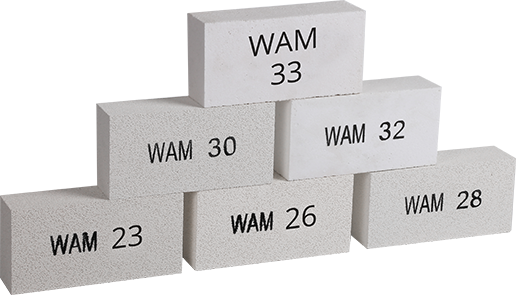The Best Solution For Your Specific Needs
The Best Solution For Your Specific Needs
 Tel: +86-532-85717690/85717352/85832089
Tel: +86-532-85717690/85717352/85832089 E-mail: wam@wamcn.net
E-mail: wam@wamcn.net
Bricks have been used in construction for centuries, but as technology advances, new materials are developed that can offer unique benefits over traditional ones.
Insulating bricks are one such material that has gained popularity in recent years due to their superior thermal insulation properties. But how do they compare to traditional bricks in terms of fire resistance, thermal insulation, strength, durability, and water absorption?
In this article, we will explore the key differences between insulating bricks and traditional bricks to help you make an informed decision for your construction project.

Insulating bricks are highly fire-resistant due to their unique composition, which allows them to withstand extremely high temperatures without degrading or losing their insulating properties.
Their high melting point, low thermal conductivity, and ability to resist thermal shock make them ideal for use in high-temperature applications such as furnaces, ovens, and kilns.
In contrast, traditional bricks are generally less fire-resistant and can crack when exposed to high temperatures. This makes insulating bricks a preferred choice for applications where fire resistance is critical for safety and structural integrity.
Insulating bricks have superior thermal insulation properties compared to traditional bricks. This is because insulating bricks are made from lightweight materials that have low thermal conductivity, which means they can trap air pockets and prevent heat from escaping or entering the building.
The high insulation value of insulating bricks reduces the amount of energy needed to heat or cool a building, resulting in significant energy cost savings over time.
In contrast, traditional bricks have high thermal conductivity, which means they can transfer heat quickly through the walls, resulting in heat loss during cold weather and heat gain during hot weather.
This makes insulating bricks a preferred choice for energy-efficient construction, particularly in regions with extreme temperature variations.
Insulating bricks are generally less dense and lighter than traditional bricks, but they can still provide excellent strength and durability.
Their unique composition allows them to withstand high temperatures, thermal shock, and chemical erosion, making them ideal for use in harsh environments such as kilns and furnaces.
Additionally, the lightweight nature of insulating bricks means they exert less pressure on the foundation and structure of a building, resulting in less strain on the overall building system. This can help to increase the lifespan of the building and reduce the need for maintenance over time.
Insulating bricks have lower water absorption compared to traditional bricks. This is due to their composition, which contains less porous materials, resulting in a denser and less permeable product.
The lower water absorption rate of insulating bricks makes them less susceptible to damage from water, such as freeze-thaw cycles, efflorescence, and staining.
This also means that insulating bricks require less maintenance and repair compared to traditional bricks, which can be prone to water-related damage over time.
We pride ourselves on providing high-quality insulating bricks that can meet your specific construction needs. Our insulating bricks are made from premium materials that are lightweight, efficient, and environmentally friendly.
They have been tested to meet industry standards for thermal insulation, strength, and durability, ensuring that your project is built to last. We offer competitive pricing, fast delivery, and excellent customer service, making us a reliable partner for all your construction needs.
If you're looking for the best insulating bricks on the market, kindly click here.